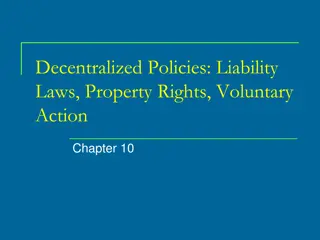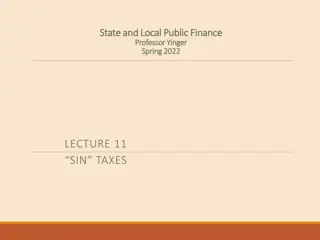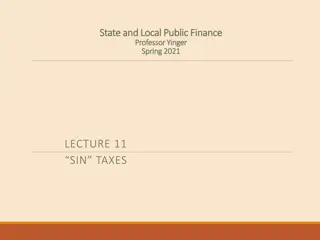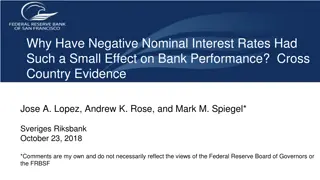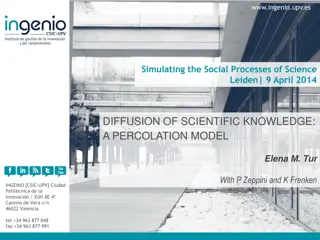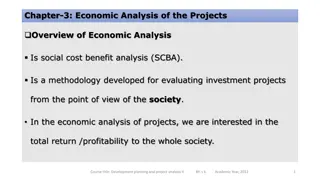Buy Negative Google Reviews
Buy Negative Google Reviews\nWith the advancement of technology, businesses are now becoming online-dependent. Google has now become an unbreakable platform for any online business. If you have a business site on Google, Google Reviews on that site are very important for the growth of your interacti
1 views • 16 slides
RATIONAL NUMBER ARITHMETIC. Day 1: Interpreting Negative Numbers
Explore the concept of negative numbers through practical scenarios such as temperature readings and elevation differences. Learn how to compare rational numbers and describe measurements in relation to sea level, all while engaging in group activities and exercises. Enhance your understanding of ne
1 views • 8 slides
Cash Flow Estimation and Risk Analysis Overview
This content delves into the principles of cash flow estimation and risk analysis in project evaluation. It covers learning objectives, incremental cash flows, treatment of financing costs, sunk costs, opportunity costs, and externalities in financial decision-making. Understanding these concepts is
1 views • 35 slides
Economic Analysis for Development Planning and Project Evaluation
Economic analysis plays a crucial role in evaluating both public and private investments, with a focus on identifying costs and benefits that may not always be captured in financial analyses. Externalities, such as infrastructure costs and benefits like flood control, are considered in economic asse
0 views • 68 slides
Decentralized Policies and Liability Laws in Environmental Protection
Explore the concept of decentralized policies in managing environmental pollution, focusing on liability laws, property rights, and voluntary actions. Discover how decentralized approaches offer advantages in addressing environmental externalities and how liability laws can change incentives for pol
1 views • 37 slides
The Relationship between RIASEC Personality Types and Negative Thinking: Insights for Career Counseling
Explore the connection between RIASEC personality types and negative career thoughts, utilizing measures like the Self-Directed Search and Career Thoughts Inventory. The study delves into the impact of various personality types on endorsing negative career thoughts, offering implications for effecti
0 views • 24 slides
The Problem of Social Cost: Coase's Analysis and Revisions
Coase (1960) revisited Pigou's (1920) approach on harmful actions and externalities, emphasizing the reciprocal nature of the problem. He proposed considering social net products alongside private products, emphasizing the importance of rights and efficient resource allocation. This critical analysi
0 views • 12 slides
Confusion Matrix and Performance Measurement Metrics
Explore the concept of confusion matrix, a crucial tool in evaluating the performance of classifiers. Learn about True Positive, False Negative, False Positive, and True Negative classifications. Dive into performance evaluation metrics like Accuracy, True Positive Rate, False Positive Rate, False N
3 views • 13 slides
Overview of Fiscal Policy and Market Failures
Learn about fiscal policy decisions and their economic impact at different levels, understand the basics of a free enterprise system, and explore concepts like government expenditures, taxation, externalities, and potential market failures. Dive into categorizing goods based on rival consumption and
0 views • 39 slides
Co-Effects of Climate Change and GHG Mitigation Policies
Explore the interplay between climate change and greenhouse gas mitigation policies, including their economic perspectives, measurement methods, and government interventions. Discover how these policies generate externalities and impact various sectors such as agriculture, forestry, and energy. Dive
0 views • 33 slides
Strategies to Address Pollution and Negative Externalities
Exploring the concept of negative externalities, the text discusses how markets interact to allocate resources and the ethical considerations involved in balancing economic activities with pollution reduction. It presents three effective ways to mitigate negative externalities, such as command and c
0 views • 24 slides
The Power of Negative Influence: Bad is Stronger than Good
Understanding human irrationality and the tendency to focus more on negative experiences can influence decision-making and behavior. Negative campaign ads, the impact of winning and losing, and the concept that bad experiences carry more weight than good ones all highlight how cognitive bias plays a
0 views • 14 slides
The Economics of Privacy: Evolution and Implications
The field of privacy economics has evolved over the years, from concealing information to exchanging it for economic benefits. Early theories by Posner and Stigler highlighted the redistributive nature of privacy decisions. Varian's work in the mid-1990s emphasized the importance of property rights
0 views • 49 slides
Tax and Transfer Policies in Public Economics
Exploring the rationale behind taxes and transfers in public economics, this lecture delves into the objectives such as public good provision, redistribution, addressing externalities, and stabilization. It also discusses the fundamentals of welfare theorems and presents basic facts about taxes and
0 views • 10 slides
Exchange Rate Behavior with Negative Interest Rates: Early Observations by Andrew K. Rose
In this study, Andrew K. Rose examines the exchange rate behavior in economies with negative nominal interest rates, focusing on the impact and implications of such rates on exchange rates. The findings suggest limited observable consequences on exchange rate behavior, with similarities in shocks dr
0 views • 42 slides
The Value of a Millisecond: Assessing Regulatory Interventions in Financial Markets
The discussion explores the challenges in evaluating regulatory interventions due to overlapping issues and externalities. Authors utilize innovative methodologies to study the impact of speed bumps on trading activities. The assessment highlights the discriminatory nature of speed bumps and their s
0 views • 10 slides
An Overview of Debate: Propositions, Teams, and Formats
Debate is a regulated discussion between two matched sides discussing a proposition, with the affirmative arguing for change and the negative defending the status quo. The standard debate format involves constructive arguments followed by rebuttals from both sides. The roles in a debate include the
0 views • 47 slides
Sin Taxes in State and Local Public Finance
Sin taxes are levied on products with negative externalities, such as alcohol, tobacco, and gambling. While they generate revenue and aim to discourage consumption, their long-term revenue potential is limited. Policy changes may be needed to strengthen sin tax revenue growth and prevent tax evasion
0 views • 54 slides
Asymmetric Information and Externalities in Microeconomics
Explore the concepts of adverse selection, market inefficiency, signaling, and moral hazard arising from asymmetric information in microeconomics. Delve into scenarios like the Market for Lemons and health insurance to grasp how information deficiencies impact economic outcomes. Additionally, analyz
0 views • 22 slides
Guide to Giving Negative Commands in Spanish
Learn how to effectively communicate what not to do in Spanish with negative commands. Understand the different forms of negative commands for -AR, -ER/-IR verbs, irregular verbs, direct object pronouns, stem-changing verbs, and verb forms ending in -CAR, -GAR, -ZAR. Master the rules and exceptions
2 views • 12 slides
Negative -T Commands in Spanish
Negative -T commands in Spanish are used to tell someone what not to do. These commands are often directed at friends or familiar individuals. Forming negative -T commands involves starting with the YO form in the present tense, dropping the O for -ER/-IR verbs, adding -ES for -AR verbs, and includi
0 views • 50 slides
Negative Numbers in Year 5 Mathematics Lesson
In this Year 5 mathematics lesson on negative numbers, students learn to recognize and use negative numbers through various activities such as placing them on a number line, counting back through zero, and calculating the differences between positive and negative numbers. The lesson also prompts stu
0 views • 23 slides
Sin Taxes in State and Local Public Finance
Sin taxes are imposed on products with perceived negative externalities in society, such as alcohol, tobacco, and gambling. While they generate some revenue for governments, there are limitations and potential drawbacks, including uncertain long-term revenue prospects and the risk of decreased consu
0 views • 51 slides
Exploring the Possibility of People with Negative Height
This article delves into the theoretical concept of people with negative height, discussing the probabilities based on normal distribution models and empirical rules. It explores the likelihood of encountering individuals with negative height in today's population, throughout history, and the number
0 views • 10 slides
Market Failure, Externalities, and Public Goods
Market failure occurs when the equilibrium is not Pareto efficient, often due to externalities where the actions of individuals or firms impact others without compensation. Positive externalities like bee pollination and negative externalities such as air pollution from power plants are examples. By
0 views • 39 slides
Public Goods and Market Imperfections
Public goods are non-rival and non-excludable in consumption, posing challenges for free market provision due to free-riding. Market imperfections like monopoly and externalities deviate from perfect competition assumptions, impacting economic efficiency. Government intervention can address public g
0 views • 23 slides
Outcome of AEG Consultation on Treatment of Negative Interest Rates by Real Sector Division IMF Statistics Department
A detailed analysis of the outcome of the AEG consultation on the treatment of negative interest rates by the Real Sector Division IMF Statistics Department. The summary includes members' agreement with the proposed treatment, the closure of the consultation, feedback received, and the need for furt
0 views • 5 slides
Non-Negative Tensor Factorization with RESCAL
This article discusses non-negative tensor factorization with RESCAL, covering topics such as Non-Negative Matrix Factorization, Multiplicative Updates, RESCAL for Relational Learning, and Non-Negative Constraint for RESCAL. It explores how factorizing matrices/tensors into non-negative factors can
0 views • 11 slides
Impact of Negative Nominal Interest Rates on Bank Performance: Cross-Country Insights
Examining the effects of negative nominal interest rates on bank performance reveals challenges in maintaining profitability, with concerns around reduced interest rate margins and disruptions to monetary transmission mechanisms. Empirical evidence suggests a reluctance among banks to impose negativ
3 views • 43 slides
Insights on Regulation, Market Failures, and Capture Theory
Disciplined monopolies internalize externalities and enhance social welfare, but small groups with large potential benefits often drive regulation for self-interest. Capture theory suggests regulatory capture by firms over time, leading to favoritism and high rates of return for regulated industries
0 views • 23 slides
Impact of Negative Nominal Interest Rates on Bank Performance
Negative nominal interest rates, implemented following the financial crisis, have had a limited effect on bank performance globally. While low rates reduce profitability, banks have shown resilience through adjustments in funding allocations and non-interest income sources. Studies suggest that resp
0 views • 34 slides
School Food Service Update and Financial Overview
Within the School Food Service update, information is provided on negative account balances, personal parent notifications, and payment options available to parents. The data includes details on total negative balances, number of families contacted, and payment methods. Challenges with negative bala
0 views • 5 slides
Challenges and Opportunities in Sri Lanka's Energy Sector
Sri Lanka's energy landscape faces various challenges including reliance on coal, exhausted hydro power capacity, and low efficiency in power generation. Major issues involve considering coal without accounting for externalities, low hydro plant factors, and government vs. private ownership. Improvi
0 views • 16 slides
Spatial Externalities of Technological Innovation and Economic Growth: Empirical Study
This study explores the spatial externalities of technological innovation and economic growth, focusing on the convergence of growth rates in different regions. It delves into the impact of knowledge capital, patents, human capital, and internet development on regional growth rates. Various theories
0 views • 26 slides
Social Processes of Science: A Percolation Model
Exploring the diffusion of scientific knowledge through social networks, this study investigates the impact of social pressure and assortativity on the spread of ideas. With a focus on social dynamics and network structures, it delves into how local interactions influence global diffusion patterns.
0 views • 24 slides
Macroeconomic Policy Framework for Structural Transformation of African Economies
Structural transformation is essential for the development of African economies, involving shifts towards higher productive activities and inclusive growth. The process requires purposeful efforts to create articulated economies with coordinated economic activities and positive externalities. Emphas
0 views • 13 slides
Bellman-Ford Algorithm: Shortest Path with Negative Edge Length
The Bellman-Ford algorithm addresses the challenge of finding the shortest path in graphs with negative edge lengths, particularly useful in scenarios such as arbitrage in currency exchange rates. By utilizing dynamic programming and steps iteration, the algorithm efficiently detects negative cycles
2 views • 16 slides
Discuss
In real-world scenarios, negative numbers are encountered in various situations such as temperatures below zero, debts, and measurements below sea level. Mathematics represents negative numbers using a number line where values extend in both positive and negative directions. Engage in activities to
0 views • 19 slides
Economics
Delve into thought-provoking perspectives on money, self-interest, free-market capitalism, externalities, public goods, and more. Explore the complexities of human nature and economic systems, challenging traditional notions and offering intriguing viewpoints for contemplation.
0 views • 46 slides
Economic Analysis of Projects: Social Cost Benefit Methodology
Economic analysis is crucial for evaluating investment projects from a societal perspective. It involves identifying costs and benefits, considering externalities, and assessing total returns to society. This analysis compares factors such as NPV, IRR, and BCR with financial analysis, highlighting t
0 views • 69 slides


